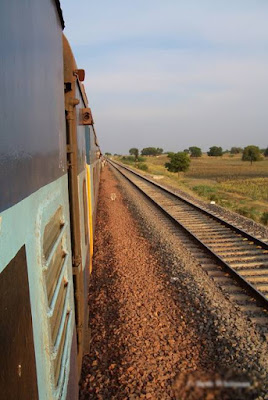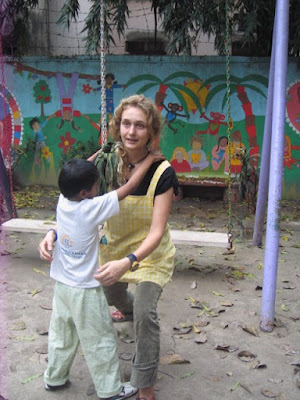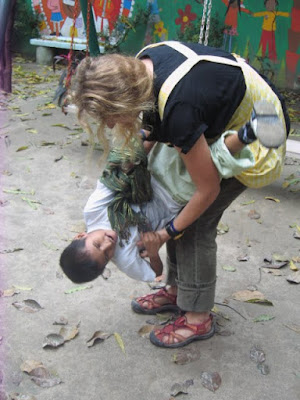
Watching the boys in their playing field leaves my mouth open and my mind flying. The younger boys attack the climbing frames. They monkey themselves along the bars like junior Olympians, balancing on the very top bar of the swings and flinging their bodies backwards and upside down. They jump from bar to bar using their arms and propelling themselves with the momentum of their bodies in a way which would leave most adult climber shaking in their shoes and leaving even the most courageous and foolhardy sighted kid panting to keep up.
I was accompanied by a retinue of boys eager to show off and to have their photo taken. The majority of the boys are totally blind, but this did not stop their demands for photographic proof of their talents. Some of the boys have a degree of sight, hindered by incredibly low vision. These boys would pull my camera screen so close to their faces that it would touch their cheeks, and then a reassuring smile would appear, showing that they had recognised their image. Likewise, my dive computer was proving to be a winner with all, as the totally blind boys pressed the buttons and the sighted boys took turns in pulling my wrist to their eyes and reading the time out loud. Whenever I asked a question, they would reply with the characteristic affirmative head wobble, unique to most of India. It was mystifying how they had been taught the action so accurately; whether a teacher had taken their heads in their hands and moved it from side to side? They movement is so subtle in its precision that I still find impossible to imitate, despite having a hundred of visual renditions each day.
Meters away a group of boys were playing cricket. It was equally as incredible to witness. The cricket ball made a rattling sound and after the bowler had taken it in his hand he would confirm the location of the batter by calling 'ready?' to which a affirmative reply would echo. He would then bowl with a reverse arm loop, causing the ball to fly into the sky before rolling along the ground, rapidly rattling its way towards the listening batsman. If the ball hit the wickets a metal 'ping' would ring out and the boys would either cheer or groan. However, if the ball was hit all would listen and run in the correct direction. If the ball was hit high up into the sky, the boys would end up running around in puzzled circles listening for its non-existent rattle. Once it landed they would run alongside it stooping down to scoop it up. It was powerful to watch, and inspiring to see the courage which the boys ran around the field with, especially considering that most did so in what was for them complete darkness. They conversed about cricket as if it was a deep ingrained passion, reflecting their subconscious nationalism, as the adoration of cricket is an addiction common throughout the country. They talked excitedly about the recent India/ South Africa game, and proudly reminded me that it was their countrymen who were the victors. I guess the spoken commentary meant that they need not be able to watch the match in order to follow it, and yet for some unexplainable reason I found it amazing that they developed such a strong passion for the national sport on a par with their sighted peers.
These boys are incredible sports men – they have no fear. They follow their senses, running with a surety despite the many obstacles plaguing their paths. They relay on a finely tuned sense of balance which leaves me simultaneously amazed and naively protective as they swing and throw themselves around in a way which sighted children would not have the courage to do. Their sense of hearing is so accurate that they are constantly reorientating their bodies in accordance with the movements and motions around them. Their internal map of their school and home is deeply moulded in the minds of even the youngest of boys, as they all run confidently through the buildings and around the playground. Body contact and verbal communication is of the utmost importance, and the boys are constantly touching each other and standing incredibly close, with their low vision friends filling in any missing information which might come into focus as he shares the treasure of his own incredibly limited vision.
The boys demonstrate what is possible for blind children and young people, and how they have developed the most extra-ordinary skills. These are skills – such as increased awareness, memory of their surroundings, balance and courage - which Deepa is inclined towards. But what is currently inhibiting the fruition of this specific and deeply powerful skill set, is the lack of any mentors and expert guidance. Here in the centre of the city of Pune, 2004 kilometers from Sishu Bahvan, is a community of children and young people who are perfectly adapted to life without sight. They are visibly exploding with potential and have just the right degree of cultivated confidence and awareness that they will need to live the independent and self-sustaining lives which they are more than capable of.






















